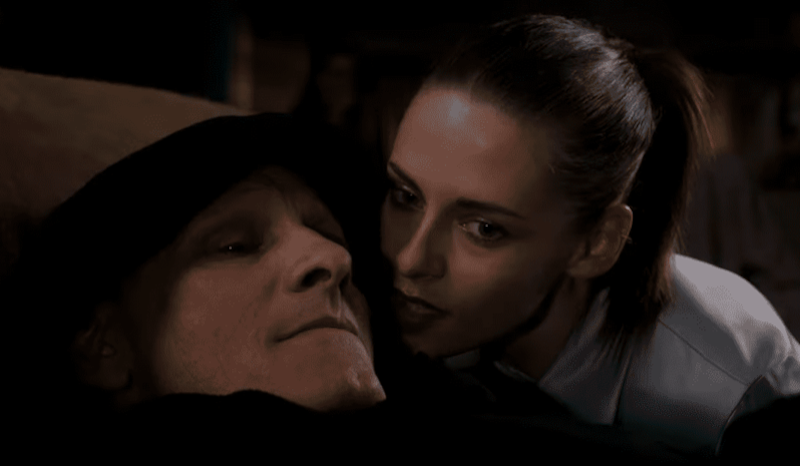Veteran horror director David Cronenberg’s Crimes of the Future isn’t about time travel but is almost a real-life time travel feat. It is, loosely speaking, a remake of his own earlier film by the same title from 52 years ago. Give him points for persistence. Long live Cronenberg. Long live the new film.
It made only about $1 million in its opening weekend, but it’s just too strange and grotesque for its makers to be surprised. It’s good nonetheless: unsettling but without either tension or jump-scares, not even much melodrama, a bit like a walk through a Matthew Barney art exhibit. Quiet but emphatically weird—a nice addition to the Cronenberg oeuvre containing the likes of Videodrome, Dead Ringers, and Naked Lunch.
The world depicted in the original, low-budget 1970 Crimes of the Future seemed dystopian but distant and fanciful. Now, roughly on schedule, we’re living in it. The original was basically a combined indictment of the cosmetics industry, which was then influential, and the biotech industry, which was essentially still imaginary. The premise was that the two industries had blended, resulting in rejuvenation-seeking adult women being either transformed into pre-pubescent children—lusted after by a cult of molesters—or simply rendered infertile. (I can’t help wishing enough elements of that original plot had been retained in the new film to create some discomfort among former associates of Jeffrey Epstein or current advocates of the puberty-blockers-dispensing, surgery-pushing trans movement, with its medical, psychological, and Big Pharma enablers.)
A sidenote in the original film was a man who began parodying the lost art of giving birth by growing new organs in his body. Such a man is the main character in the new film—Saul Tenser, played by Viggo Mortensen, with his partner in art, science, and (since the authorities limit mutations) crime played by Lea Seydoux—whose physical perfection is neither depicted as tech-enhanced nor commented upon.
One of the machines the two use in crafting Tenser’s new organs is a coffin-like chamber called a Sark, which I assume is either named ironically after the Luddite real-life British island, where the only legal means of conveyance are horses and tractors, or named aptly after the villainous manager of the computer-simulated world in the 1982 movie Tron. Either would make sense, since Crimes of the Future functions as both a mild warning about tech and a potentially inspiring reminder that flesh can in principle become a new medium of expression, as malleable as computer code or (as the film makes explicit) plastic.
I doubt this week’s sixth Jurassic film will juggle its own mixed messages about biotech a 10th as gracefully—perhaps merely punting to some ham-fisted capitalism-bashing instead, as the prior entry in the dino-series did.
If filmmakers really had guts instead of being trend-following liberals, though, we’d see more films turning the post-Covid world into fodder for all sorts of horror scenarios, with enough politics mixed in to make it all seem redeemable as highbrow commentary.
We may not yet have black-market organ-growing art festivals, but we do live in a real world where, for instance, protestors just days ago occupied a New York bookstore to push back against proof-of-vaccination requirements. We live in a world in which the more-conservative of the two major political parties objects to many Covid-inspired restrictions—but likes the Title 42 policy that swiftly sends Covid-positive Mexican immigrants back across the border to their homeland. Paranoia’s bad unless directed at those you don’t like, apparently.
We live in a world where a big social media company that took it upon itself to label claims about a vaccine causing blood clots “misinformation” is lately reduced to slapping that label on mainstream news reports about the FDA confirming the claims.
Amidst it all, de facto health czar Dr. Fauci went from ubiquitous to suddenly invisible when he became a political liability, all while both assuring people the pandemic phase of the plague is over and saying that the situation is so dire that CDC mandates shouldn’t be subject to Supreme Court review. Farewell, non-science political concerns!
But then, he’s no crazier than right-wingers like Jesse Kelly, who declared the Constitution “null and void,” since during Covid times the left doesn’t always abide by it—as if his declaration would help matters.
In short, the intimacy of biology and the forcibly public nature of politics form a queasiness-inducing, disgusting combo that one should avoid, except now it’s everywhere—everywhere!
Who can blame people like novelist Tracy Quan for admitting, perhaps a bit traumatized, that she is left feeling her anti-Covid mask is simply part of her now and that she doesn’t really ever want to remove it?
If she were a Cronenberg character, it almost goes without saying, the mask would simply be fused to her face now, a new organ. Everyone’s masks would be fused to their faces, forever, and screaming would be banned. But then, to the frustration of horror writers and citizens everywhere, that sort of scenario no longer sounds like much of a stretch, does it?
—Todd Seavey is the author of Libertarianism for Beginners and is on Twitter at @ToddSeavey

